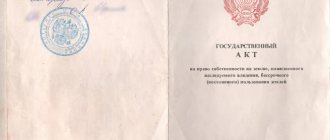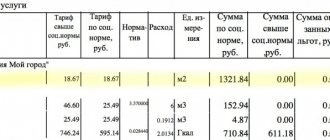Concept, characteristics and signs of property rights
Property is a relationship between subjects aimed at appropriating values.
Property rights are a community of legal norms that regulate the above relations.
The right of ownership, like other types of real rights, has some features and characteristics that allow it to be considered as a system and distinguish it from other rights.
Signs of property rights:
- a sign of a special form of objects of property law, which are really existing objects that a citizen can possess and through which he can satisfy his needs, as well as protect his interests;
- the peculiarity of establishing the subject’s relationship to property values - the right of ownership and other property rights state that property can be “one’s own”, the rest can be “someone else’s”;
- a sign of satisfaction of the interests of the subject through the implementation of his actions, and not through the actions of the obligated persons - the owner uses his material assets at his own discretion within the framework of protecting his interests through his actions, and the obligated should not interfere with the implementation of this (not violate his property rights);
- a sign by which real rights are distinguished from obligatory rights - the latter proceed from satisfying the interests of the legal holder through the actions of obligated persons;
- a sign of absoluteness that real rights have - the person who is the bearer of the burden is precisely defined, but the circle of obligations is not clearly defined;
- a sign of perpetuity of property rights.
Forms of ownership
In the scientific literature, it is customary to distinguish the following forms of property rights:
- Private property;
- Ownership rights of legal entities;
- property rights of public associations and religious organizations;
- Property rights of foreign citizens, legal organizations and countries.
- State property, as well as the property of federal subjects.
The ownership rights of individual citizens and legal entities are not limited by the quantity and value of property, however, there are certain items of property rights that private individuals can own; the ownership rights in these cases belong to the state and its authorities.
Under state ownership in the Russian Federation We have already completed an essay
Statehood of Russia. It is customary to understand in more detail things that belong to the Russian Federation and its constituent entities. Ownership rights, in this case, may belong to municipalities or ministries, as well as to government agencies and enterprises. Municipal property usually includes the right of ownership of urban and rural settlements, as well as the right assigned to municipalities. The same right can be assigned to institutions and enterprises owned and used by the municipality itself. A feature of municipal property rights is the possibility of transferring property into the ownership of citizens and private legal entities, in the manner provided for in the legislation on property privatization.
Have questions about this topic? Ask a question to the teacher and get an answer in 15 minutes! Ask a Question
Note 1
A special feature of the right of ownership of public and religious associations is the right to use their property for the purposes that are enshrined in the constituent documents of the organization.
The concept of ownership and use rights
The right of ownership is the ability to own a certain thing defined in legislation. In other words, the authorized person can physically have this thing in his possession and bear the burden of preserving it.
The burden bearer is considered in a broad concept. The property is owned by the one who can influence it physically, technically or otherwise.
Thus, not only the owner has the right of ownership. If the legal owner transfers a thing for storage, rent, collateral, or free use, then the person who accepted the thing acquires the right of ownership. However, the owner does not lose it - he only ceases to implement it.
The right of use is a legally established opportunity to use property in order to derive benefit from it. The right of use can take on different natures and forms, mainly depending on the properties of a particular property. The right of use provides for the possibility of using a thing both for its intended purpose and in another way.
The right of use determines that a thing can be used by third parties with the consent of the owner of the property. For example, the right of use provides that the landlord, for a certain fee from the tenant, is obliged to provide residential premises within the framework of the following rights:
- right of use;
- temporary right of use;
- temporary possession.
Property rights concept
As a concept, property rights have many definitions in the legal literature.
In most cases, it is considered from two positions: in the objective and subjective sense. Definition 1
In an objective sense, property rights are presented as a set of legally enshrined norms that protect and secure the ownership of property by certain legal entities and individuals, as well as reflecting the volume and content of the owner’s rights, methods and limits for the implementation of these rights.
Definition 2
In a subjective sense, the right of ownership means the right of ownership, use, and disposal by the owner of his property within the boundaries defined by law.
Finished works on a similar topic
- Course work Forms and types of property rights 440 rub.
- Abstract Forms and types of property rights 230 rub.
- Test work Forms and types of property rights 220 rub.
Receive completed work or specialist advice on your educational project Find out the cost
From the above, we can conclude about the dual nature of the concept of property rights.
Forced alienation of property benefits
The Constitution of the Russian Federation states that a citizen can be deprived of residential premises only by a decision of the relevant judicial authority.
The fundamentals of civil law establish that the bearer of the burden exercises his powers solely in order to protect his own interests, desires and power. In other cases, if a person is deprived of residential premises without his initiative, there is a violation of the law. Exception - the law has authorized a person who forcibly deprives a citizen of a living space or forces a citizen to engage in certain behavior to carry out such actions.
Forced alienation of property can be carried out:
- to meet government needs;
- exclusively on the condition of equivalent material compensation to the citizen deprived of residential premises.
Types of real estate ownership
In accordance with Article 213 of the Civil Code of the Russian Federation, all property that is in the possession of citizens or organizations is considered private property. Among such real estate, it is possible to distinguish residential premises (private houses, apartments), non-residential premises (warehouse, office), ancillary buildings (bathhouse, garage), etc.
- private (real estate owners are only legal entities or citizens);
- municipal (the property is owned by local governments);
- state (the owner of the property is considered to be the state or constituent entities of the Russian Federation);
- other forms provided for by Russian legislation.
We recommend reading: Registration of a Land Share in Property by Inheritance
Property rights to natural resources
The right of ownership of natural resources, such as land plots, subsoil and other natural resources, is exercised in the manner of disposal of other types of property assets.
However, there are certain restrictions on ownership of natural resources:
- there should be no violation of the interests of citizens;
- the exercise of rights can be carried out only to the extent that restrictions on the circulation of relevant natural resources are established by law;
- the content of land ownership does not allow damage to natural resources.
What rights are there?
If you study the legal legislation, it becomes clear that property rights can be divided into the following types:
- real;
- obligatory;
- intellectual.
Types of property rights are not directly related to production taxation activities. This classification is used more in specific activities.
Real
The definition of real rights refers to such a concept as a thing. And this type of rights can be realized if, for example, you lease out the property. When such a transfer occurs, the right to dispose of the property remains with the owner, but the tenant can own and use the property.
This means that the owner of the property receives a restriction on use for exactly the period that the lease agreement will be valid. Another person will own and use it; the owner retains the right of disposal.
If during this time the ownership of the property passes to another person, this is not grounds for termination of the lease agreement.
If we talk about property values as objects of civil legal relations, then it is worth understanding that not only one person can be the owner. That is, ownership rights to a property may belong to several persons in different shares. This is primarily the joint property of the spouses, which was acquired by them during the official marriage.
When the rights to property are joint, then it can be disposed of only by mutual consent. And when one of the spouses does this, the consent of the other is required.
It follows that real rights relate to property rights, being their integral part. Property rights, in turn, are of the following types:
- lifelong inheritance of the right to a land plot;
- unlimited use of a plot of land;
- easement;
- operational management;
- economic management.
Commitment
The next type of rights to property are rights of obligations.
They arise when damage to property is caused, based on the standards available in the law. That is, if the debtor has obligations to the creditor, he must fulfill them, in accordance with Article 307 of the Civil Code of the Russian Federation. In these legal relations, the parties to the obligations are the creditor and the debtor. When it comes to transferring property for temporary use under a lease agreement, the owner of the property has the right to demand from the person who is the tenant that all payments are made on time and that the property is handled carefully. In this case, the tenant will be responsible for the property that is in his possession for a certain period of time.
When a lease agreement is concluded, the tenant has the opportunity to use and own the property. The owner, in turn, reserves the right to dispose of the object. Here we are talking about real rights. But, since a lease agreement is concluded, legal obligations also come into force. It is according to them that the responsibilities and rights of both parties will be determined.
In this case, it turns out that some rights (real) give rise to the emergence of other legal relations (obligatory). They arise directly from the concluded agreement for the rental of property between the parties.
Trust management
Trust management of citizens' property is implemented through the procedure for sending things by the owner for management. Trust management of property is one of the methods of implementing the right to dispose of material assets.
The property trust management agreement contains 2 participants in the procedure - the founder of the management process and the manager.
A property trust management agreement declares that the manager implements trust management of property in order to protect the interests of the holder of the right or other individuals.
The property trust management agreement must also stipulate that real rights are not transferred from the owner of the property to the manager.
Author of the article
Properties
This is such a thing, product, object that is owned by the subject. There are:
- movable property (for example, car, household items, electronics, jewelry);
- real estate (land and buildings that cannot be moved to another place without destroying them; as well as vessels - air, sea, inland navigation - which must be registered);
- money, securities, non-cash funds;
- animals;
- objects of intellectual property;
- Natural resources.







